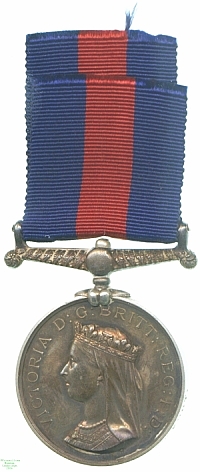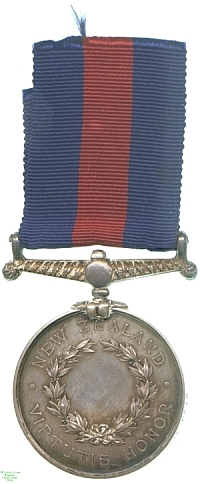
Obverse, a bust of Queen Victoria with veil

Reverse, laurel wreath within the inscription

Obverse, a bust of Queen Victoria with veil |

Reverse, laurel wreath within the inscription |
The New Zealand Medal was instituted in 1869 to recognise service in the New Zealand Wars of 1845-46, 1847 and 1860-66, and not for any of the other conflicts in that or a wider period in the islands. The phrase New Zealand Wars covers a variety of affrays, whose common factors were relatively few beyond that all, at some level, involved government forces suppressing risings by the indigenous Maori peoples. The background to the conflicts was misunderstandings and lapses, more or less wilful from case to case, in the implementation of the Treaty of Waitangi by which in 1840 the newly-instituted New Zealand government had protected the Maori tribes from loss of their lands. Not all the conflicts for which the New Zealand Medal was awarded were of this kind, however, some rather being wars between Maori tribes in which one side had managed to engage the government.
There were twenty-eight different sorts of New Zealand Medal awarded, of which twenty-seven bore the dates of different periods of service, some of which overlapped or enveloped the periods of other issues. There was also an undated medal issued for those whose service dates were no longer recorded, which might serve for any of the other twenty-seven; this example is one of these issues.
It was awarded to Private Owen Coughlan of the 65th Foot, for service in the campaigns of 1845-1847. These, otherwise known as the Flagstaff War, resulted from a subsection of the Maori tribes who had agreed the Treaty of Waitangi becoming unhappy with the new situation. Emblematic of the opposition became a flagpole in Kororareka (now Russell). Increasingly serious attacks by some Maori tribes cut this pole down a total of four times, after the fourth of which the town's survivors were evacuated. Other Maori tribes however regretted this infraction of the Treaty by which they hoped to retain their position, and combined with government forces in the suppression of the rising, which went through a number of difficult battles in some of which British troops played no part at all. At the point at which the Maori rebels were persuaded to sue for peace in exchange for pardon, British losses perhaps slightly outnumbered all the Maori ones. The flagstaff at Kororareka was left where it had fallen until the Maoris replaced it in 1858.
Coughlan's unit, the 65th Foot, arrived in New Zealand only as this war was ending, and saw no action; he may however have fought in a skirmish between British troops and Maori tribesmen at Horokiri or in an inconclusive stand-off between British and Maori forces at Wanganui in 1847. Lester Watson purchased Coughlan's medal at some point before 1928.